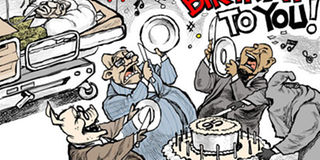Response to murder of 'Darfur 7' must be firm

What you need to know:
From the moment the sad news reached the country to the time their bodies arrived home from Sudan, family and country have been in mourning. Still, our commitment to international peace and security remains solid.
Tanzanians have every reason to grieve the dastardly killing of seven of our gallant soldiers in the line of service with the United Nations Mission in Darfur (Unamid) on July, 13, 2013.
From the moment the sad news reached the country to the time their bodies arrived home from Sudan, family and country have been in mourning. Still, our commitment to international peace and security remains solid.
There is no way that Tanzania, a country that has earned enormous credit as highly principled, can be cowed by a bunch of ruffians into reneging on such critical obligations as peacekeeping. Despite the decade long conflict in the Sudan region of Darfur, in February this year Tanzania decided to answer the international call to duty by sending 875 dedicated Tanzania Peoples Defence Forces (TPDF) soldiers to Darfur on a peacekeeping mission.
The seven blue-helmets, whose lives we continue to honour and celebrate today, were among our troops that joined Unamid without qualms. Their only mission was service to Africa and the international community. Their death has not been in vain; we salute them; and mourn with their families, as well as the rest of the TPDF.
We also join Commander-in- Chief and President Jakaya Kikwete in leading efforts – diplomatic and good offices – towards international investigation, and in urging Khartoum to cooperate fully in bringing to book the authors of the killings and the wounding of 17 others. The seven, were on a peace mission some 25 km from their base in Khor Abeche.
Khartoum’s role
Unamid (UN-AU Hybrid Mission in Darfur) was authorized by UN Security Council Resolution 1769 of July 31, 2007. It operates under Chapter Seven of the UN Charter, covering the right to use force to protect civilians, UN and humanitarian players on the ground. However, mandate authorisation under Chapter 7 is no panacea to other factors of mandate implementation.
In July 2012, the UN extended the mandate of Unamid by one year, urging all the parties to the conflict in Darfur – Sudanese Government forces and allied militias, and rebel groups, at each other since 2003 - to stop violence and attacks on civilians and peace-keepers.
This is not happening and peace remains elusive; that is why attacks and killing of troops continue unabated. The fatal attack of July 13, the worst ever, has been viewed as part of the escalating atrocities also targeting the Unamid convoys.
In the wake of repeated deadly attacks on peacekeepers, our fallen troops expect that UN response will match the irreparable sacrifice made by peace-keepers in the service of peace and security. Khartoum must be held to account for this and past incidents, along with increased international pressure being brought to bear on all belligerents. Otherwise, the ringing condemnations from the international community will be yet another perfunctory lip service. It is a trend that is bound to provide a licence to ruffians elsewhere, to kill and maim.
God rest the souls of our fallen heroes in peace.




